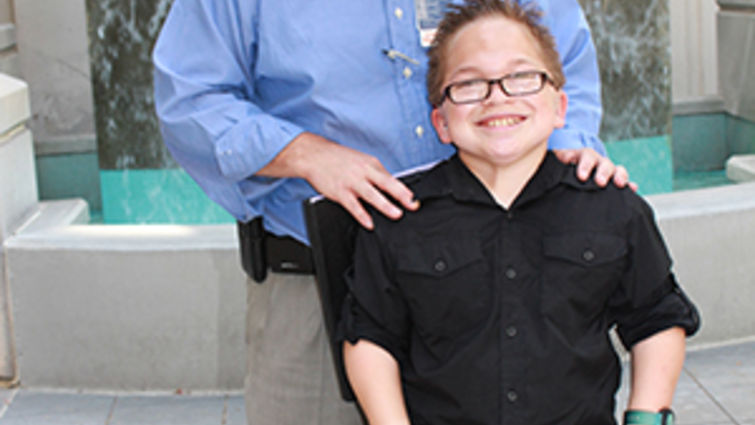
Nearly 600 children have completed the MEND program, which was developed by Daniel Tapanes, MA. Tapanes is the recipient of the 2016 President’s Award.
Search after search, the 15-year-old carefully googled his symptoms until he was certain; he had diabetes. He kept it to himself as long as he could.
Later, after a doctor confirmed the diagnosis, his parents kept a constant watch. “You can’t eat that. Have you checked your blood sugar?” To the teen, the pestering seemed nonstop.
Every week, tension in the family grew.
Enter a superhero.
If a definition of a modern superhero is one who possesses special insight and uses it to do good things, 2016 President’s Award recipient Daniel Tapanes is a strong candidate to be a real-life superhero.
Tapanes, who graduates from Loma Linda University Sunday, June 12 with a doctorate in marital and family therapy degree, created a program at Loma Linda University Health for kids living with chronic conditions. Nearly 600 children have completed MEND, which stands for Mastering Each New Direction for medically complex youth.
It would be fascinating to visit with each MEND graduate, to hear hundreds of stories about how each discovered or rediscovered hope that has led to living life fully, with a greater understanding of self and others.
“A child who needs a heart or kidney transplant or who develops a chronic condition such as diabetes,” says Tapanes, “may live with the beliefs, ‘I won’t finish school; I won’t live long enough to graduate from high school or college. No one will love me; I’ll never get married.’”
This hopelessness can lead to depression, noncompliance with medical guidance and increased visits to the ER. “Tragically,” says Tapanes, “even more complicated medical issues may occur, and donated organs have been lost unnecessarily.”
And with approximately 27 percent of children in the United States living with chronic illnesses, the need is great.
MEND has proven so successful that surgeons from outside the Inland Empire are now referring select patients who are on transplant waiting lists to the program.
“As they and their families progress through MEND,” says Tapanes, “they begin to experience hope. They are empowered to take care of their health and to follow medical guidance. This helps them become more able to successfully manage a transplant.
“Studies have shown that resulting impact to overall health is measurable.” He continues. “As MEND participants begin to experience and live what they are learning, medical costs plummet.”
On average, families reduced their medical expenses by $15,248 over 12 months. This equated to a cost benefit ratio of .32 for costs (inclusive of indirect costs associated with missed days of work and caregiver needs).
Similar feelings of anxiety, depression and issues with changes to one’s body that may occur because of illness exist for those experiencing health issues, “everyone from park bench to Park Place, illness is not a respecter of persons,” says Tapanes. “While attending MEND, kids and their families work together with a compassionate team of expert therapists and clinicians to explore feelings regarding illness, worries about getting sick again, life expectancy, and reaching academic and career goals.”
After the finest procedure that takes place in a state-of-the-art facility with a perfectly matching, donated organ, surgeons cannot control what happens when the patient returns home. Because of this, Tapanes is asked for insight into whether the patient and family can support the complex regimen of medication, follow-up procedures and appointments that occur after a transplant, as well as the motivation to comply with medical guidance.
Patients from Loma Linda University Children’s Hospital, from throughout the University of California system and from states outside of California, have traveled to Loma Linda to complete the program, which focuses on challenges specific to each child’s condition, including anxiety, body image, treatment compliance, depression, family issues, grief, loss and self-esteem.
It is estimated that each year $100 to $300 billion dollars of health care costs in the United States annually are directly associated to limited adherence to medical regime.
Studies are revealing significant benefits to the patient, the family and to the health care system when patients feel hope and are empowered to take care of their health. Research into the program is continuing. In a collaborative effort between Tapanes, researchers from Loma Linda University, Loma Linda University Children’s hospital and Loma Linda University Behavioral Medicine Center, prepared a research proposal for National Institutes of Health funding. It was submitted June 3.
The program recently expanded to include adults who are living with chronic diseases or who have experienced medical conditions such as a stroke.
Plans are now underway to certify therapists as MEND-certified, with interest from one of the nation's top research universities on the east coast. There is also international interest from places such as India.
Not only is Tapanes skilled at saving people in the safety of the hospital and clinic, he once made a career out of rushing into places when others were fleeing. He pursued a career in mental health after retiring from his job as a firefighter.
Tapanes has always been interested in helping kids; while employed by the fire department, he developed Clear View Treatment Centers, five residential treatment facilities for the treatment of adjudicated youth who are dually diagnosed.
In 2012, Tapanes received the Behavioral Health Community Advocate of the Year Award from the County of San Bernardino Behavioral Health. He will receive the Excellence in Research Award from the School of Behavioral Health during a hooding ceremony June 10. He was selected by the School of Behavioral Health as the recipient of the 2016 President’s Award for his excellent scholarship, professionalism, exemplary leadership and passion for his field.
